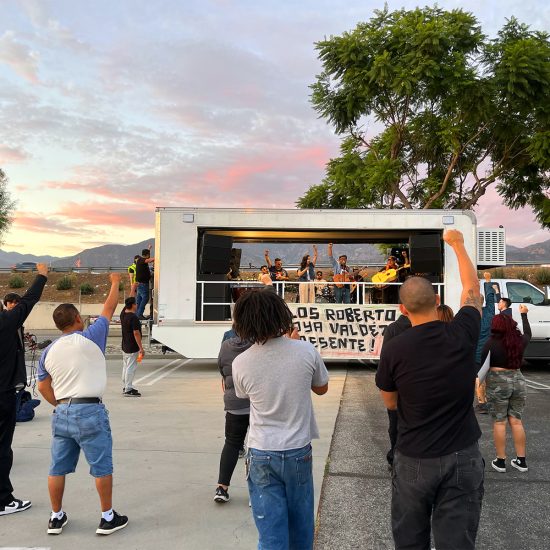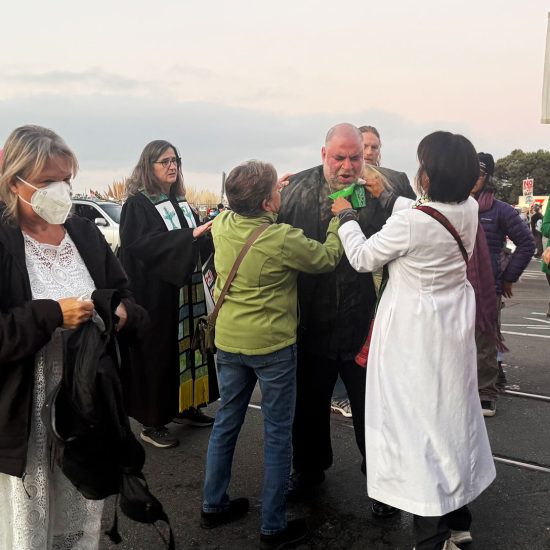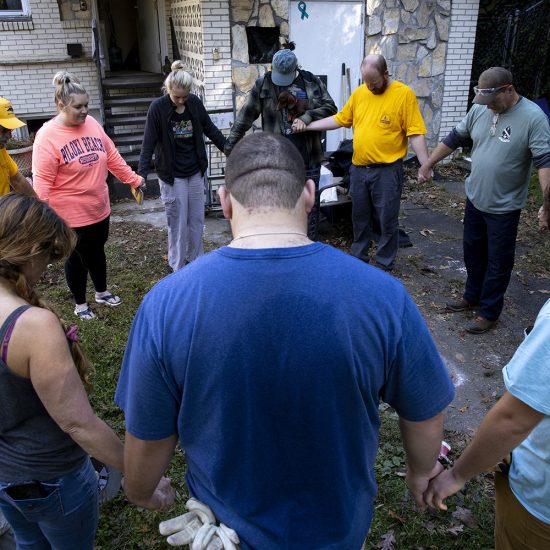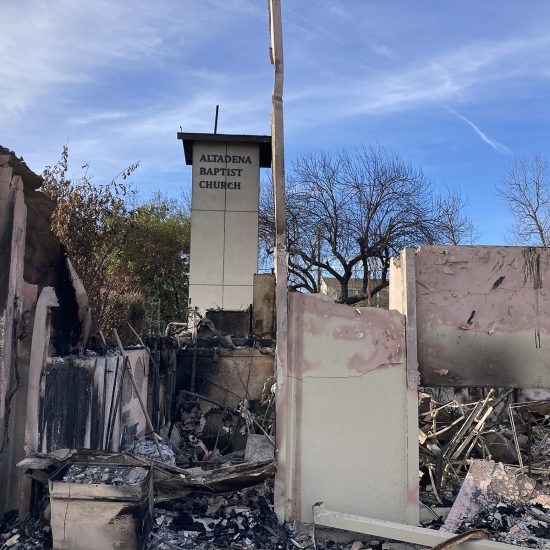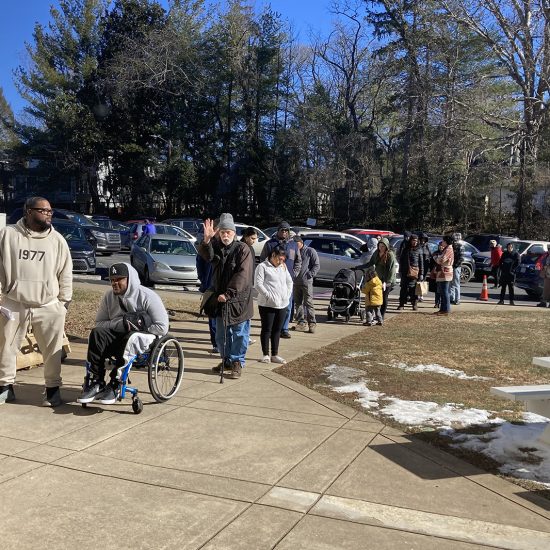LOS ANGELES (RNS) — Pick any road in Redding, Calif., and community members will tell you they aren’t surprised to see handmade thank-you signs lining the streets.
Typically the signs consist of block letters, hearts and firefighter figures meant to convey Californians’ gratitude for emergency helpers following one of the state’s worst fires.
“I think it’s been really powerful for this community to learn what it means to say ‘thank you,’” said the Rev. Janet Chapman of First Christian Church of Redding (Disciples of Christ). “I hope we never forget that.”
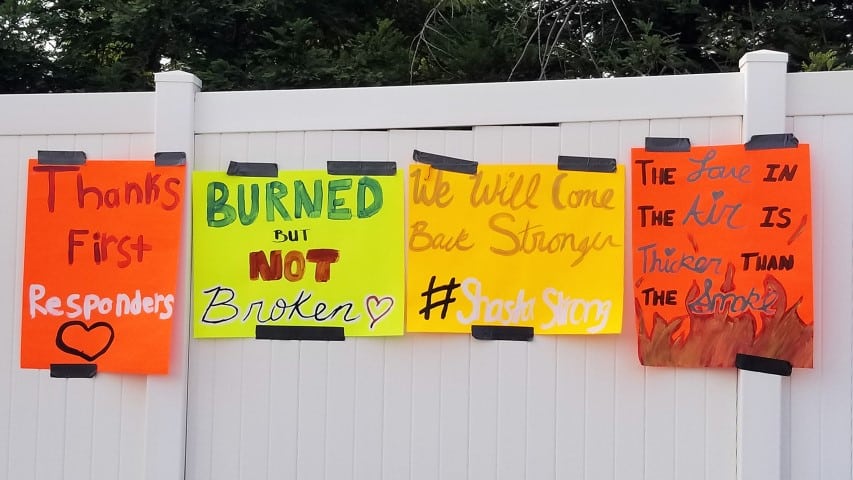 Signs posted in Redding express thanks and resilience from the local community. Photo courtesy the Rev. Janet ChapmanIn northern California, the Carr fire and Mendocino Complex fires are 70 percent contained. In total, more than 800,000 acres across the state have burned, making it one of the worst fire seasons in California’s history.
Signs posted in Redding express thanks and resilience from the local community. Photo courtesy the Rev. Janet ChapmanIn northern California, the Carr fire and Mendocino Complex fires are 70 percent contained. In total, more than 800,000 acres across the state have burned, making it one of the worst fire seasons in California’s history.
While the fires are mostly contained, about 1,600 structures, mostly homes, were consumed. The road to recovery stretches well into the future.
In addition to firefighters, the Red Cross and local and state first responders, churches, parachurch organizations and individuals have all stepped up to help.
Chapman’s church was just outside the evacuation line.
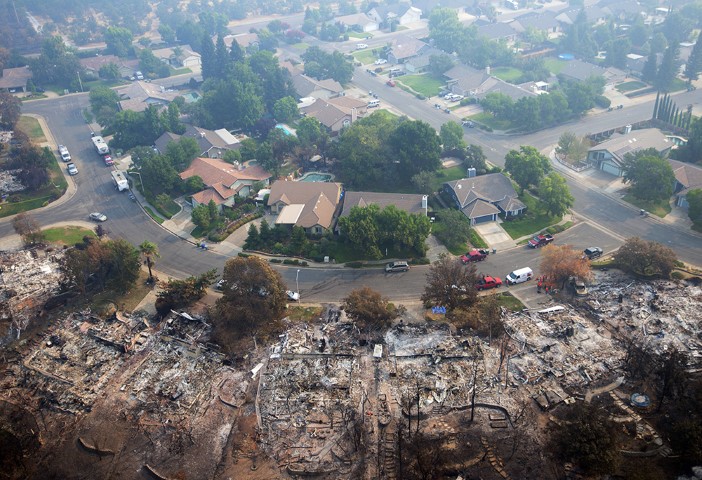 Homes destroyed by a wildfire are seen from an aerial view in the Keswick neighborhood of Redding, Calif., on Aug. 10, 2018. Fire crews have made progress against the biggest blaze in California history but officials say the fire won’t be fully contained until September. (AP Photo/Michael Burke)It welcomed anyone needing a safe place to house their cats and dogs, especially if they were looking for a place where people and pets could stay together.
Homes destroyed by a wildfire are seen from an aerial view in the Keswick neighborhood of Redding, Calif., on Aug. 10, 2018. Fire crews have made progress against the biggest blaze in California history but officials say the fire won’t be fully contained until September. (AP Photo/Michael Burke)It welcomed anyone needing a safe place to house their cats and dogs, especially if they were looking for a place where people and pets could stay together.
“This church was founded 20 years ago on the idea that all are welcome,” Chapman said. “And all means all, with the understanding that for some people, their family includes pets.”
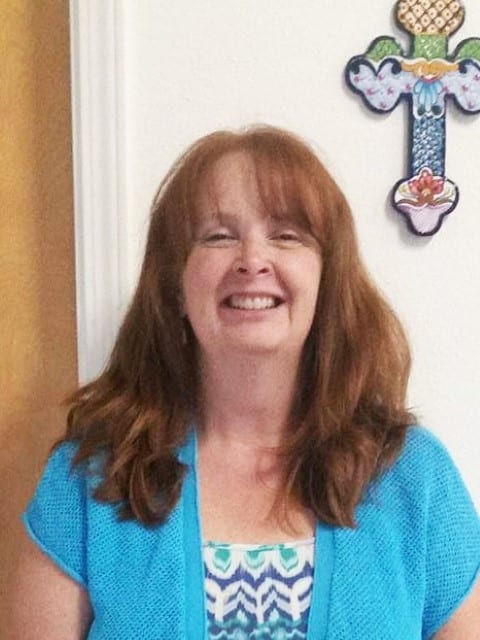 The Rev. Janet Chapman of First Christian Church of Redding (Disciples of Christ). Photo courtesy Janet ChapmanIn many ways, it was a natural fit. Chapman said First Christian Church has always been pet-friendly and occasionally welcomes them in worship services.
The Rev. Janet Chapman of First Christian Church of Redding (Disciples of Christ). Photo courtesy Janet ChapmanIn many ways, it was a natural fit. Chapman said First Christian Church has always been pet-friendly and occasionally welcomes them in worship services.
During the fires, six animals and eight people stayed at the church. Volunteers bought air mattresses, bottled water and food. The local Humane Society donated crates and pet food.
Many of the evacuees stayed for a short time, said Chapman. Three people and four cats are currently living in the building.
One of the people and two of the cats escaped the “firenado,” a fire tornado that reached speeds of up to 165 mph and exceeded 2,700 degrees Fahrenheit, according to Cal Fire. It was the cause of death of 37-year-old Redding firefighter Jeremiah “Jeremy” Stoke.
Almost a month after Stoke’s death, there’s still much uncertainty.
“They don’t teach this stuff in seminary,” Chapman said. “We are simply taking every day as it comes and are trying to be sensitive to the needs of the community.”
Learning to deal with disaster
Leading a community through a disaster is overwhelming and scary. That’s where one group, Hope Crisis Response Network, steps in.
The Indiana-based nonprofit teaches church leaders how to respond to manmade and natural disasters, coordinating the best ways to get donations, volunteers and assistance with a long-term recovery plan. It also rebuilds homes.
The network has been helping 13 California communities deal with the Carr and Mendocino Complex fires.
Kevin Cox, CEO and founder, said although HCRN is best known for its homebuilding, the organization also helps meet families’ emotional, physical, financial and spiritual needs.
“We don’t just focus on rebuilding a house, we work on the restoring of one’s life,” Cox said.
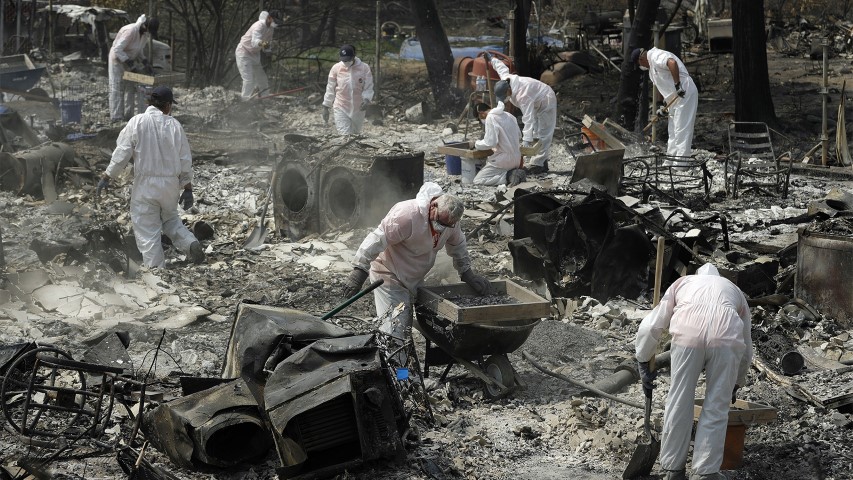 Volunteers with Samaritan’s Purse sift through the charred remains of a home burned in the Carr Fire on Aug. 10, 2018, in Redding, Calif. (AP Photo/John Locher)Cox said that congregations should designate someone other than the pastor to organize disaster relief. The pastor, he said, needs to be focused on spiritual healing for the community.
Volunteers with Samaritan’s Purse sift through the charred remains of a home burned in the Carr Fire on Aug. 10, 2018, in Redding, Calif. (AP Photo/John Locher)Cox said that congregations should designate someone other than the pastor to organize disaster relief. The pastor, he said, needs to be focused on spiritual healing for the community.
Cox said he expects HCRN to stay in Redding and the surrounding areas for up to five years.
“We’re not going to bail on a community just because there’s another disaster somewhere,” Cox said.
Neighborly spirit
It’s this kind of togetherness that makes Redding home for Brandon Wegner, president and CEO of Redding Software Corporation.
Wegner, who was wounded while serving in Afghanistan and belongs to the Military Order of the Purple Heart, knew he had something to contribute.
“It’s such a tight community; people care about people,” he said.
Wegner is nonreligious, so he leaned on his work experience to make a difference. He set up an online service for evacuees who needed rides. The online service also allowed people to volunteer to be drivers.
His idea came from the Drunk Driving Prevention Program, which Wegner led from 2011 to 2018, a service that provides free rides to members of the military.
The Red Cross isn’t allowed to offer rides, so the service provided transportation to shelters, doctors appointments and, eventually, back home. One woman used the service to get to a chemotherapy appointment.
If a volunteer wasn’t available, Wegner said, the service paid for a taxi.
Redding Software is now partnering with United Way to help people donate directly to fire victims and to challenge companies to donate part of their net sales to various charities. Redding Software kicked off the challenge by donating 20 percent of total sales in August to United Way’s Shasta County Fire Relief Fund.
“If I was in that situation, I hope someone would want to help me,” Wegner said. “It’s just the right thing to do.”
A state of emergency
For many, government help is still forthcoming. On July 28, President Trump declared a state of emergency in the state of California. The Department of Homeland Security and the Federal Emergency Management Agency have begun coordinating disaster recovery efforts in the affected areas.
But even before this year’s fires, the Associated Press reported that insurance companies wouldn’t sell homeowners’ policies in areas prone to wildfires, a problem many fear will only worsen.
The Church Mutual Insurance Company, the largest insurer of religious organizations in the U.S., is trying to prevent that from happening to churches through a pilot program it started in July.
“We recognized that we were fortunate that we had not had a significant amount of losses over a five-year period,” said Tom Kluxdal, director of innovation at Church Mutual Insurance Company. “But we knew our luck was running out.”
The pilot program provides fire protection services by going out and putting flame retardant on church buildings or removing flammable debris. It also offers a Risk Control Center that clients can call to ask questions and make decisions about opening their buildings as shelters.
Small gestures
In a recent sermon, Chapman shared a story of hope and thankfulness.
A first responder had been tasked with checking in on a house with chickens and cats that had previously been evacuated. The house was completely burnt, but she found a hen sitting on two eggs and left it some feed and water.
When the first responder returned, she found a note thanking her for saving the hen.
Finding the time for a thank-you note meant so much to the first responder, Chapman said. It was just another example of the heart of Redding.


